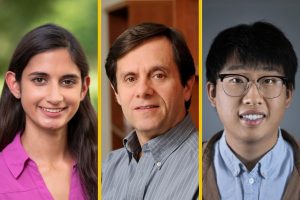
Three CS faculty members and their collaborative research teams have been chosen to receive 2024 Johns Hopkins Discovery Awards. Chosen from a record 286 proposals, Anjalie Field, Peter Kazanzides, and Ziang Xiao are among 148 individuals on the 44 multidisciplinary endeavors that have been selected to receive support this year.
The Discovery Awards program was announced in early 2015, as was the Catalyst Awards program for early-career researchers. Together the two programs represent a $45 million university commitment by university leadership, along with the deans and directors of JHU’s divisions, to faculty-led research.
The Discovery Awards are intended to spark new interactions among investigators across the university rather than to support established projects. Teams can apply for up to $100,000 to explore a new area of collaborative work with special emphasis on preparing for an externally funded large-scale grant or cooperative agreement.
Field’s primary interests include using natural language processing to model social science concepts; her current work is focused on identifying social biases in various domains, including Wikipedia, social media, and social workers’ notes. She will work with G. Caleb Alexander, a professor of epidemiology at the Bloomberg School of Public Health, and Louis Hyman, the Dorothy Ross Professor of Political Economy in History at the Krieger School of Arts and Sciences, on “Large Language Models for Knowledge Discovery in the Opioid Industry Documents Archive,” co-funded with the Johns Hopkins Data Science and AI Institute.
Kazanzides focuses on computer-integrated surgery and satellite servicing, real-time sensing to account for uncertainty, and systems engineering to enable deployment in the real world, while the goal of Xiao’s research is to enhance human-AI interaction to expand our knowledge of ourselves. Together—along with Kemar Green and John Probasco, faculty in the Department of Neurology at the School of Medicine; Ayah Zirikly, an assistant research scientist in the Whiting School’s Center for Language and Speech Processing; Vishal Patel, an associate professor of electrical and computer engineering; and Youseph Yazdi, an assistant professor of biomedical engineering—they will research “Virtual Neurology Clinic: A Human-AI Interface for Remote Autonomous Augmented/Virtual Reality Neurologic Screening and Triaging,” a project co-funded with the Johns Hopkins Institute for Assured Autonomy.